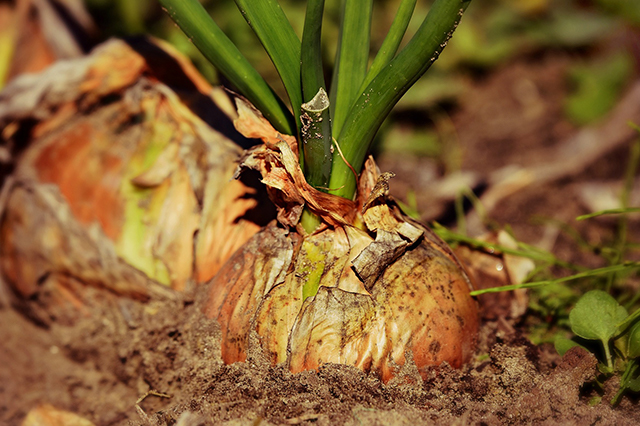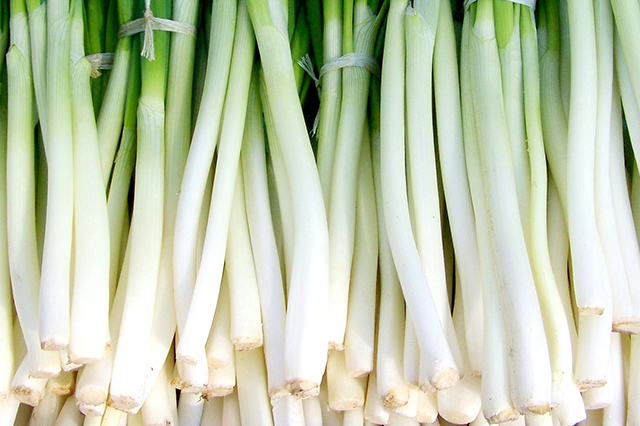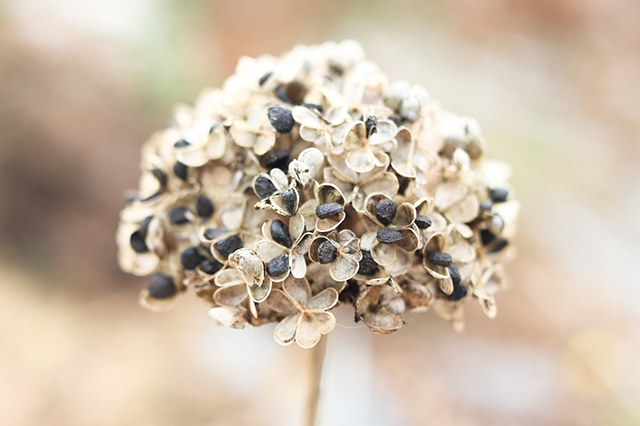Need help with how to grow onions in your garden? Understanding how onions grow and what conditions help them thrive will give you the best shot at growing large, healthy, and flavorful onions.

gardeninginfo-online.com gathered essential information and tips on growing big, healthy, and flavor-packed onions.
Growing Onions
Onions are a surprisingly easy vegetable crop to grow. They are typically planted early in the spring and can be harvested from midsummer through the fall. Whether you plant your onions from seed or sets, there are some valuable tricks that make a startling difference between an excellent onion crop and a disappointing one. Below is what you need to know about growing onions so that they are healthy and delicious:
1. How Long do Onions Take to Grow?
An onion’s growth typically requires 100 to 175 days before reaching maturity. In other words, onions take about 3 to 4 months from planting to harvest. If you want spring onions (green onions), harvest them 3 to 4 weeks after you’ve planted your sets.
2. What Month Should Onions be Planted?
In spring, plant onion sets outdoors as soon as the ground can be worked, usually in late March or April (when temperatures are no longer likely to go below 28°F). In spring, start onion seeds indoors about 6 weeks before transplanting them to the ground (once the soil reaches at least 50°F).
3. What is The Best Soil for Onions?
Onions grow best in well-drained soil with a 6.0 to 7.0 pH and high in organic matter. Apply phosphorus (P) and potassium (K) according to soil test recommendations.
Note: Basic soil tests identify its organic matter quantity, its pH, and macronutrient (nitrogen (N), phosphorous (P) and, potassium (K)) levels. These standard tests only provide information on soil characteristics.
Tip: Contact your local Cooperative Extension office. Most state universities provide top-quality, affordable soil testing services through their Cooperative Extension Service.
4. How Much Sun do Onions Need?
To grow large onion bulbs, they need to get enough daylight hours. Onions need full sun and at least 13 to 16 hours of light daily during bulb formation.
5. How Much Water do Onions Need?
Onions need about 1 inch of weekly water. Stick your finger in the soil near the plants – if you can’t feel moisture up to one inch, it’s time to water. In a typical 12-week growing season, irrigate with one inch of water once or twice a week, depending on the amount of rainfall.
6. How Many Onions Will One Plant Produce?

One bulb will produce one onion. Sets can be planted 2 inches apart if harvested as scallions or ‘green onions’ or 4 to 6 inches apart if allowed to mature into a full-sized cooking onion.
Note: By cutting off the bottom of an onion bulb and planting it in soil, you can grow an onion from cuttings. With time, patience, and water, you can grow an onion from an onion bottom in 90 to 120 days.
7. How do I Get My Onions to Grow Bigger?
Growing larger onions depends on a few factors, including:
- Choosing the Right Variety (Onion varieties are typically divided into long-day, short-day, and intermediate-day).
- Planting them on Time (Planting onions late will result in underdeveloped, smaller bulbs).
- Control Weeds
- Water and Fertilize
Note: Like other plant and vegetable species, your onions will grow better if given optimal conditions to thrive.
8. Which Onion Variety is Right for My Garden?
Long-day onions need about 14 to 15 hours of daylight to bulb (far northern regions). Short-day onions need 10 hours of daylight (far southern regions). Intermediate-day onion varieties are the most adaptable, requiring 12-14 hours of sunlight before starting to bulb.
9. Should Onions be Fertilized?
Yes. Onions are heavy feeders with shallow root systems, so adequate soil fertilization is essential for a high-yield onion crop. A nitrogen-based fertilizer (ammonium sulfate or ammonium nitrate) can be applied (one cup per twenty feet of row).
Note: The first fertilizer application should be about three weeks after planting, then continue with applications every 2 to 3 weeks.
10. Should You Soak Onions Before Planting?

You can undoubtedly plant onions without soaking them, but soaked onions will sprout more quickly. You can also soak onion seeds before planting to encourage their germination.
Note: Soaking onions in compost tea will give them added nutrition and increased protection from disease.
11. Will Onions Reseed Themselves?
Yes. Onions and scallions are self-seeding vegetables. These biennials overwinter and, in the spring, flower and produce seeds. You can collect these seeds or allow the plants to re-sow where they are.
Growing Onions in Your Garden
In this article, you discovered essential information on growing onions in your garden and answers to frequently asked questions.
Knowing what conditions onions require to flourish in your garden will help you grow larger and more flavor-packed onions in your home’s garden.
Ignoring basic onion growing requirements will leave your garden struggling to produce a healthy onion harvest.
Sources:
ohioline.osu.edu/factsheet/hyg-1616
extension.umn.edu/vegetables/growing-onions
extension.unh.edu/blog/2020/10/how-do-i-get-my-onions-grow-bigger
growingwithnature.org/perennial-onions/
The post What You Need to Know about Growing Onions appeared first on http://gardeninginfo-online.com.
No comments:
Post a Comment